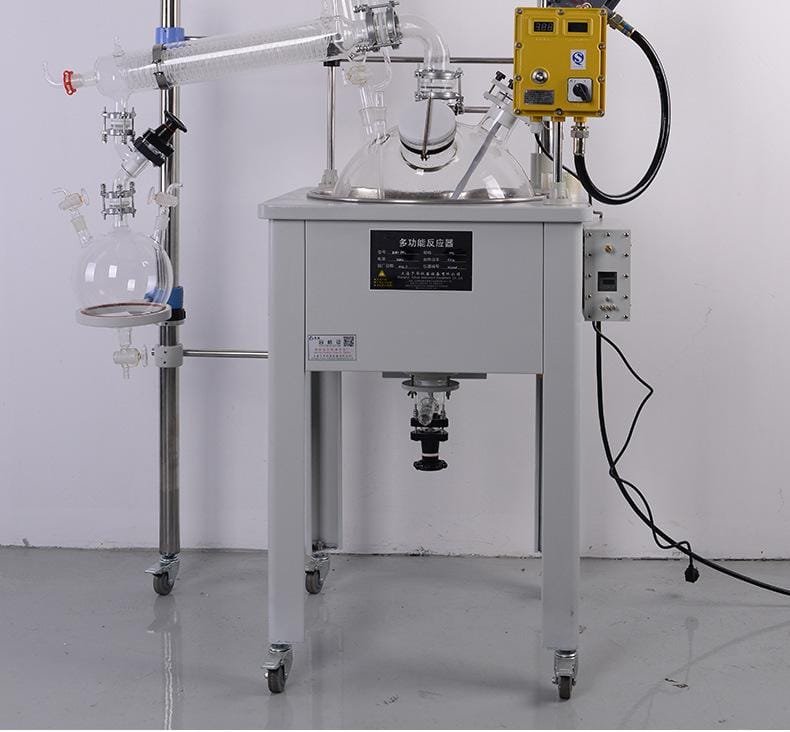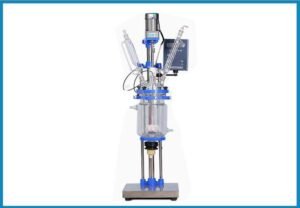Introduction to Eco-Friendly Laboratory Glass Reactors
In recent years, sustainability has become a key focus in industries across the globe, including scientific research and laboratory operations. As the demand for eco-conscious solutions increases, eco-friendly laboratory glass reactors have emerged as an innovative and sustainable alternative to traditional laboratory equipment. These reactors offer significant environmental advantages while still providing the high performance needed for chemical processes in various industries.
A eco-friendly laboratory glass reactor combines the precision and durability of traditional glass reactors with a commitment to minimizing environmental impact. These reactors are particularly valuable in industries like pharmaceuticals, biotechnology, and environmental research, where chemical reactions need to be conducted with both efficiency and sustainability in mind.

What Makes a Laboratory Glass Reactor Eco-Friendly?
The term “eco-friendly” in the context of laboratory equipment refers to the materials, design, and operational efficiency that help reduce the environmental footprint of the equipment. Here are the key factors that contribute to making a eco-friendly laboratory glass reactor a sustainable choice for modern laboratories:
1. Use of Sustainable Materials
The core material used in a eco-friendly laboratory glass reactor is borosilicate glass, which is highly durable and resistant to thermal shock and chemical corrosion. Borosilicate glass has a long lifespan, reducing the need for frequent replacements. Unlike other materials that may require energy-intensive recycling processes, glass is more energy-efficient to recycle, making it a more sustainable option in the long run.
Additionally, some eco-friendly laboratory glass reactors are designed with recyclable components, ensuring that when the reactor reaches the end of its lifecycle, it can be disposed of in an environmentally responsible manner.
2. Energy Efficiency
A significant feature of eco-friendly laboratory glass reactors is their energy efficiency. These reactors are designed to minimize energy consumption while maintaining the performance needed for precise chemical reactions. Energy-efficient heating systems, such as oil baths and water baths, are often incorporated into these reactors to ensure that energy is used effectively during the reaction process.
For example, the AKDF-2L Single Glass Reactor from EquilRxnLab is designed to provide efficient temperature control while reducing unnecessary energy usage, thus contributing to a more eco-conscious operation.
3. Reduced Chemical Waste
Many eco-friendly laboratory glass reactors are designed with features that reduce chemical waste during experiments. For example, reactors may include sealed systems or vacuum functionalities that limit the exposure of chemicals to the environment. This not only ensures safer operation but also minimizes the potential for hazardous chemical disposal, which can contribute to environmental pollution.
By controlling the chemical environment more effectively, eco-friendly laboratory glass reactors also contribute to reducing the risk of contamination and maintaining cleaner, more sustainable laboratory practices.
Applications of Eco-Friendly Laboratory Glass Reactors
The versatility and sustainability of eco-friendly laboratory glass reactors make them suitable for a wide range of applications across different industries. Some of the key sectors benefiting from these eco-friendly reactors include:
1. Pharmaceuticals and Biotechnology
In pharmaceutical research and biotechnology, eco-friendly laboratory glass reactors are used for the synthesis of active pharmaceutical ingredients (APIs), drug formulations, and biologics. These reactors allow researchers to conduct precise chemical reactions while ensuring that the environmental impact is minimized. The ability to recycle and reuse materials also helps reduce waste, which is essential in these highly regulated industries.
Additionally, the eco-friendly features of these reactors, such as energy efficiency and reduced chemical waste, align with the growing emphasis on sustainability in pharmaceutical manufacturing.
2. Environmental Research and Testing
In environmental research, eco-friendly laboratory glass reactors are used for simulating environmental conditions and studying chemical processes such as biodegradation, water treatment, and pollutant removal. The ability to conduct reactions under controlled conditions allows researchers to study the effectiveness of different environmental treatments, all while adhering to sustainable laboratory practices.
By reducing chemical waste and ensuring energy-efficient processes, these reactors contribute to the ongoing effort to develop environmentally friendly solutions for pressing global challenges.
3. Chemical Manufacturing and Production
Chemical manufacturers can also benefit from eco-friendly laboratory glass reactors during the pilot-scale production of chemicals, materials, and intermediates. These reactors allow for more sustainable production practices by optimizing energy consumption, reducing waste, and using materials that are safer for the environment. Their scalability ensures that manufacturers can transition from laboratory to production with minimal impact on the environment.
4. Food and Beverage Industry
In the food and beverage industry, eco-friendly laboratory glass reactors are employed to produce ingredients such as flavorings, colorants, and preservatives. The precise control over temperature and mixing conditions ensures that the final product meets industry standards while minimizing the environmental footprint of the production process.
Benefits of Using Eco-Friendly Laboratory Glass Reactors
The adoption of eco-friendly laboratory glass reactors offers several key benefits:
1. Cost-Effectiveness
Although eco-friendly laboratory glass reactors are often perceived as higher in price, their energy efficiency and long lifespan make them a cost-effective solution in the long run. By reducing energy consumption, minimizing chemical waste, and decreasing the need for frequent replacements, these reactors provide significant savings over time.
2. Sustainability and Regulatory Compliance
With increasing environmental regulations, especially in industries such as pharmaceuticals and biotechnology, using eco-friendly laboratory glass reactors can help companies comply with environmental standards. Sustainable lab practices not only contribute to a greener planet but also help companies avoid costly fines related to improper waste disposal and energy usage.
3. Enhanced Operational Efficiency
Eco-friendly laboratory glass reactors are designed to improve operational efficiency. With features such as automated temperature control, precise agitation, and vacuum capabilities, these reactors enable laboratories to achieve better results in less time, ultimately leading to higher productivity.
For more information about eco-friendly reactors, visit the EquilRxnLab product catalog and explore a variety of reactors designed for different applications.
Where to Buy Eco-Friendly Laboratory Glass Reactors
Choosing the right eco-friendly laboratory glass reactors supplier is essential to ensuring quality and reliability. Reputable suppliers, such as EquilRxnLab, offer high-quality reactors designed with sustainability in mind. Their product range includes models suitable for both research and large-scale production, such as the AKDF-2L Single Glass Reactor, which is designed to meet both energy efficiency and performance requirements.
Explore a range of eco-friendly laboratory glass reactors at EquilRxnLab and ensure that your laboratory operations are more sustainable.



